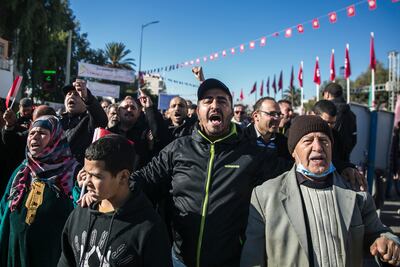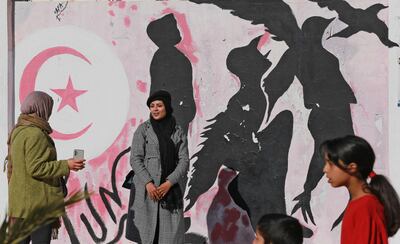Eleven years after Mohammed Bouazizi, a young fruit seller pushed to the margins of society, lit himself on fire in a moment of economic agony and ignited the Tunisian revolution, little has changed for those in similar circumstances.
Unemployment rests at 18 per cent and is higher for those with degrees, and World Bank figures show that inflation is 10 times wage growth.
At opposing rallies on Friday — the new official date for celebrating the revolution — Tunisians voiced divided opinions on whether President Kais Saied was in fact the man to lead the country out of its social, economic and political quagmire.
“It's been a dark decade since the revolution and we want a better situation,” said Bouthinina, 34. She was attending a small rally called in support of Mr Saied, which filled the steps of the National Theatre.
“Saied can deliver that.”
Vendors selling balloons, Tunisian flags, and other trinkets threaded through the thin crowd as music blasted over a loudspeaker. At the other end of Habib Bourguiba Avenue, the main thoroughfare in Tunis, a more robust crowd had gathered to voice their opposition to what they called Mr Saied's “coup".
Mr Saied sacked his government, froze the Tunisian Parliament and assumed sole rule of the country in July in an attempt to pump the brakes on the country's failing political structure. The move was widely supported at the time by Tunisians who felt left behind by their government and frustrated by the political class.
But in the months since, Mr Saied has become isolated, appointing a government with weakened power only in October, failing to create a sustainable economic plan and refusing to engage in dialogue with any parties or civil society organisations. Pressure mounted from allies both internal and foreign to announce a road map out of the crisis and public opinion faltered.
“He stopped listening to the whole population — even though his slogan is 'The People Want' — and he is only listening to his own people,” said Hasna, 65.
On Monday, Mr Saied announced a road map, which includes a digital “consultation period” to be held between January 1 and March 20, followed by a national referendum on a new constitution on July 25, and new parliamentary elections on December 17, 2022 — nearly 18 months since he took sole control of the country.

Reaction to the announcement was swift and overwhelmingly negative.
Several political parties condemned the action and called for a “united front” against Mr Saied and the secretary general of the powerful General Tunisian Labour Union, Noureddine Taboubi, called for a “third way” out of the crisis.
“Until when are we going to discuss the constitution? People today have empty stomachs and are getting poorer,” he told reporters at a news conference in Sfax.
Member of Parliament Samir Dilou, who left the Ennahda party this year, said: “Saied’s speech reflects the state of denial in which he lives and his refusal to listen to anyone, neither his supporters nor his opponents.”
Monia Mejeri, a university professor attending the anti-Saied demonstration on Friday, was particularly sceptical of the timing of Mr Saied's announcement.
“He took a pre-emptive step to give his speech about the new elections. He knew there were large protests planned and that people are rejecting the continuation of the emergency measures, so he put out a timeline to appease people.”
Small protests
Police blocked off much of central Tunis early in the morning to keep protesters from gathering, but several hundred people affiliated with a group called Citizens Against the Coup gathered under an overpass to express their discontent.
The protest had been planned for weeks and the police blocked access points to the main avenue where the rally had been planned.
Undeterred, the group waved flags, and shouted one of the main slogans of the revolution, retrofit for the moment: “Work, freedom and national dignity!” became “Constitution, freedom and national dignity!”

Jaouhar Ben M’Barek, one of the organisers of the group, which has called for an entire month of protests against the president, said the new road map was a ruse.
“We've learnt from other authoritarian systems that measures such as these are just a way to make a continuation of power palatable to those on the outside. But it is clear that Saied just wants to keep his grip on the constitution, the courts, the Parliament and the people for another year,” he said.
He insisted that Mr Saied “sold illusions” to the Tunisian people about jobs for the unemployed and rural development that he has been unable to produce.
Mabrouk Jebali, 65, said he supports Mr Saied, but was worried about the future for his eight children.
“One critical promise he needs to deliver on is hiring the unemployed college graduates so our children have a chance at a life,” he said.
Tunisia's economic outlook has only become more dire since Mr Saied took over. The central bank's reserves of foreign currency have nearly run dry and the country is courting the International Monetary Fund for a $5 billion loan to repay some of its other debts.
Record numbers of Tunisians are attempting to cross to Europe for a better life.
“We're not a resource-rich country,” said Mr Ben M'Barek. “We don't have the wealth to make autocracy work. Here, we rely on our people and a human being needs to be free in order to create wealth.”










